Edward Bulwer-Lytton, Writer and Politician
Fame is a fleeting thing. Someone can be a celebrity in their own time but give it a few decades and if they’re remembered at all it’s usually only for a single aspect of their lives. Newton revolutionised mathematics and ran the Royal Mint, but all people really remember him for is “discovering gravity”. Margaret Brown was a rags-to-riches heroine and an ardent suffragette, but all she’s remembered for is “surviving the Titanic”. And the list could go on. Edward Bulwer-Lytton is a victim of just such forgetfulness. In his time he was a household name, but now all most people know a single line from one of his novels. A line that, even if you’ve never heard of him, you’ll recognise.
He was born as plain Edward Bulwer at Baker Street in London in 1803. His father was General William Earl Bulwer, while his mother Elizabeth was an heiress to the Lytton family fortune. Edward was the third of three sons and the last, as his parents separated a year after he was born. Edward was a sickly child and was by far his mother’s favourite, with his brothers William and Henry dismissed into the care of their maternal grandmother. General Bulwer had a temper, which was why he and Elizabeth (who was equally strong-willed) had separated, but he was also a well-respected military man. When it was feared that Napoleon might invade England he was one of those in charge of organising a defence, and he was in line for a peerage to recognise this service in 1807 when he died.

Edward was an intelligent child but not a studious one, and he was a frequent target for bullies among the other children. This resulted in his moving schools more than once, and eventually his mother procured a private tutor for him. During this time he fell in love with a local girl he later referred to as “Lucy D”, but she was pressed into an arranged marriage by her family. (She died three years later of an illness, and Eward attended her funeral.) This left him heart-broken but free to go back to his studies, and some of that heartbreak may have gone into his first written work. It was a book of poems called Ismael: An Oriental Tale, with Other Poems. The book was almost certainly only published due to his mother financing it and didn’t sell particularly well, though it did earn him some acknowledgment from Sir Walter Scott among others.
Ismael has been described as “Byronic” in tone, and his association with that school may have been what led to his brief affair around this time with another Byronic poet: the man’s most famous lover, Lady Caroline Lamb. She was twice his age and it was only a passing fling, but it would turn out to have some severe consequences for him several years later. In 1823 at the age of 20 he went to Cambridge where he continued to write, publishing two books of poems and a novel. None of it became hugely popular, but he did win a medal from the university for one of his poems. As with most Cambridge attendees, he also established a network of contacts that would help to boost his later career. Following his graduation he traveled abroad as a celebration, spending some time in Paris. He had a dalliance with one local aristocratic daughter that might have blossomed into more, but his mother (who was opposed to the girl on the grounds that she was a Catholic) wrote to him and forced him to break it off. Edward spent some time moping in Versailles, before returning to England. At a loose end, he considered entering the army and even purchased a commission (though he would never use it and sold it on three years later). Then, at a party in 1827, he was introduced to a young woman who was a friend of his old friend Caroline Lamb. The woman was Rosina Wheeler, and Edward fell in love with her at first sight.
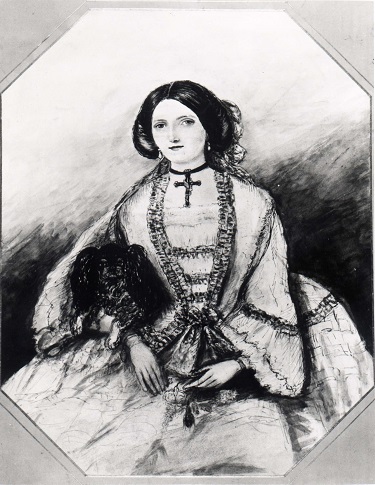
Rosina was the daughter of Anna Doyle Wheeler, a Tipperary woman who is notable as one of the earliest feminists to link women’s rights with reproductive rights through campaigning for contraception. Her father William Massey Wheeler was from aristocratic stock, though when he died in 1820 he left Anna and her daughters without any income so that she was forced to rely on her writing to make a living. Rosina was a student of Frances Arabella Rowden, a famous governess whose previous students included Emma Roberts, Letitia Elizabeth Landon – and Caroline Lamb. This meant that despite her limited means, Rosina was plugged in to the bohemian scene. She was no mean writer herself, and became a popular guest at the parties of the “Byronic” set. That was where she met Edward Bulwer.
It was a whirlwind romance; the pair publicly announced their romance in early August of 1827 and were married by the end of the month. He was 24, she was only 17. Edward’s mother Elizabeth was not very happy about this, of course, and she cut him off from his allowance. Rosina had an income of £80 a year which was nowhere near enough for a young couple to live on, so Edward was forced to become an earner. Writing was about the only trade he had, but his first “professional” novel (a tragic romance called Falkland) was a flop. The following year he changed tactics, and wrote a comedy of manners called Pelham. It was an overnight success, and all of a sudden Edward Bulwer was one of the most talked-about novelists in the land.
“God bless me,” cried Guloseton, with an air of vexation, “here comes the Duke of Stilton, a horrid person, who told me the other day, at my petit diner, when I apologized to him for some strange error of my artiste’s, by which common vinegar had been substituted for Chili—who told me—what think you he told me? You cannot guess; he told me, forsooth, that he did not care what he eat; and, for his part, he could make a very good dinner off a beef-steak! Why the deuce, then, did he come and dine with me? Could he have said any thing more cutting? Imagine my indignation, when I looked round my table and saw so many good things thrown away upon such an idiot.”
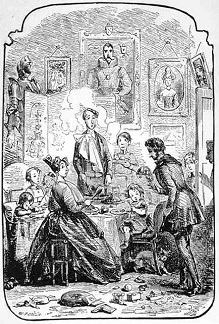
Pelham is a “silver fork novel”, a 19th century genre of social satire exaggerating the eccentricities of the upper classes. It told the story of Henry Pelham (a character very clearly based on Edward himself), his schoolyard friendship with a more aristocratic boy, and how in adulthood Pelham found himself trying to prove his friend innocent of murder. As with most such books it was popular with people who treated it as a “roman à clef” where characters could be mapped to real life inspirations, but it was the transition into crime that was the real draw. The novel is nowadays largely forgotten, but it has an important place in literary history as one of the earlier examples of what would become detective fiction.
Edward followed up Pelham with a string of best-sellers, and he was prolific enough to keep him and Rosina in a fairly lavish lifestyle. They had a daughter in 1828 who they named Emily Elizabeth, a gesture of attempted reconciliation with Edward’s mother. Edward retained some links with the rest of his family, most notably his brother Henry who was also a writer. Henry wrote memoirs of his travels in Greece (where he was one of many British volunteers fighting for independence) and throughout Europe. He was also a diplomat and dabbled in politics, something which may have influenced Edward to take an interest in social justice himself. That was the theme of his fourth commercial novel, Paul Clifford, but it remains better known for having one of the most famous opening sentences in literary history.
It was a dark and stormy night; the rain fell in torrents, except at occasional intervals, when it was checked by a violent gust of wind which swept up the streets (for it is in London that our scene lies), rattling along the house-tops, and fiercely agitating the scanty flame of the lamps that struggled against the darkness.
Paul Clifford is about a young man of that name who is originally a writer by trade, but who after being falsely imprisoned for theft reinvents himself as the dashing highwayman Captain Lovett. He falls in love with one of his targets and decides to reform his ways, but ends up under arrest and facing the death penalty. In the end it’s commuted to transportation; and he escapes Australia, reunites with his beloved and makes a new life in America. As mentioned, a major theme in the novel is judicial corruption and it is overtly political in many places. It’s not that surprising that the same year the book was published Edward went into politics himself as an MP.
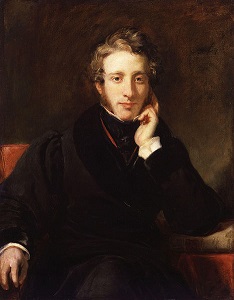
Edward was a member of the Whigs, the political party who had taken the liberal side in British politics since the 17th century. He was one of those who backed the Reform Bill which ended many of the electoral abuses and “rotten boroughs” which had made a joke of parliamentary democracy. His brother Henry was in “the House” at the same time, and the pair generally worked together as fellow Whigs. In general his political career was largely a quiet one, and he kept up his writing career throughout it. The job did offer him the opportunity for travel away from home though, which helped him in one of his other interests at this time: cheating on his wife. (To be fair, Rosina was cheating on him as well; but she was far less blatant about it.) They took a holiday to Italy in 1833 in an attempt to save their marriage. The trip did inspire one of Edward’s most popular novels (The Last Days of Pompeii), but it didn’t save their marriage. (The fact that they encountered Edward’s mistress on the trip, and that Rosina responded to this by having an affair with a local nobleman probably didn’t help.)
Edward and Rosina physically separated in 1834 and made it a legal separation in 1836. It was an acrimonious split, and like her contemporary Caroline Norton it wasn’t long until Rosina was given a sharp reminder of just how few rights women had under the English legal system at the time. Edward took her children – Emily and Edward, both under ten years of age – away from her. As their father and her husband he was the one with legal control over the family, Rosina had none. All she had was a weapon that she had set aside before her marriage, but one which she now took up again to unleash upon him: her writer’s pen.
[M]en continue to enforce the laws of God grammatically, thereby assuming a wide difference between the masculine and feminine, which is no where to be found in the text! …[M]ost husbands appear to think…that woman have no right even to mental free will, and are as much surprised at their daring to express an opinion different to that they have been commanded to entertain, as if the ground on which they walked were suddenly to exclaim, “Don’t trample on me so hardly!”
– Chevely, by Rosina Wheeler
Chevely, or A Man Of Honour was a roman à clef like Edward’s “silver fork” novels had been, but one where the reader was very much intended to figure out exactly who everyone was pretty easily. It tells the story of the unhappy marriage between the elegant Lady Julia de Clifford (based on Rosina, obviously) and her drunken unfaithful husband (Edward) as seen through the eyes of the title character, the Marquis de Chevely. The novel is particularly cutting towards the Dowager Lady de Clifford (Rosina’s mother-in-law Elizabeth). It was obvious enough what the book was really about that no reputable publisher would touch the thing, so Rosina went to a disreputable one. She found a publisher who was willing to take the chance that a failed attempt to block publication would mean huge sales. And Edward was going to try to block the publication, that was certain.
Edward’s first tactic was to threaten the publisher with a court injunction, though he wasn’t able to attain one. Next he visited the publisher and claimed that Rosina’s cousin Sir Francis Doyle (her closest male relative) did not want the book published. (Of course, he had said no such thing.) Then he wrote Rosina a letter threatening that if she published the book then he would reveal that she had been his mistress before they were married. Rosina, who knew that she had nothing to lose, showed the letter to all her friends and made sure that those in the know knew what Edward had tried to do. He claimed that she had forged the letter, something she laughed off – who would forge a letter like that?
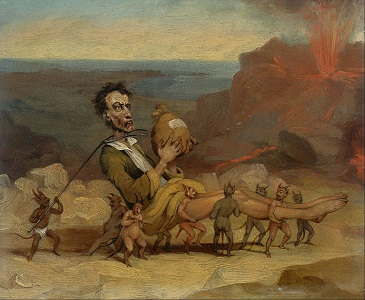
All of this scandal cannot have done Edward’s political career any favours, and in 1841 he decided to stand down as an MP. The Prime Minister, Lord Melbourne (ironically the former husband of the now deceased Caroline Lamb), offered him a seat in the House of Lords as an alternative, but he turned it down. Instead he decided to concentrate on his writing. In 1843 his mother Elizabeth died. She and Edward had reconciled after the end of his marriage, and as a condition of her will she asked that he change his name to “Bulwer-Lytton” and adopt the Lytton coat of arms. (As if to reconfirm his status as her favourite, neither of his brothers were asked to do the same.) In 1848 his daughter Emily died at the age of 19. At the time her death was said to be due to “typhus”, but modern historians think it likely that she died of a laudanum overdose (either deiberate or accidental). She suffered from polio, and the potent mixture of opium and alcohol was the only effective painkiller available in those times. If she did kill herself, it would explain why her death was covered up as typhus to avoid the scandal.
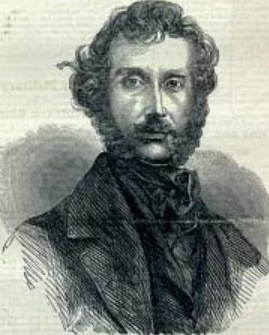
During his time outside of Parliament Edward’s allegiances shifted, and he switched parties from the Whigs to the Tories. The reason was the Corn Laws, a piece of protectionist legislation designed to use tariffs to keep the price of imported grain artificially high in order to benefit domestic producers. The downside was that the price of foods produced with that grain (such as bread) was also hugely inflated above what it should be, greatly exacerbating the effects of poverty among the lower classes. Despite what you might have expected it was the Tories (led by Robert Peel) who led the campaign in 1846 to repeal these laws, and the Whigs (led by Lord John Russell) who opposed it. This act by the supposedly “liberal” arty of the common man to prop up the power of the landowners over the welfare of the people was enough to sour Edward on his former party, and by 1851 he had firmly aligned himself with the Tories.
Edward was elected as MP for Hertfordshire in 1852. He served as an opposition MP for six years, and then stood for re-election in 1858. This election was marred by controversy, as Rosina appeared at one of his speeches to denounce him and he had her arrested. After she was in custody Edward used his influence to have her committed to Inverness Lodge, a small private asylum. Whether she actually was unstable is an open question. Some have speculated that she was bi-polar; but on the other hand Edward had beaten her and had used the law to separate her from her young children. She hardly needed to be unstable in order to hate him. In any case, it was clear that her committal was not about her welfare, but rather was about getting her out of the way and preventing any publicity. It failed on both counts.
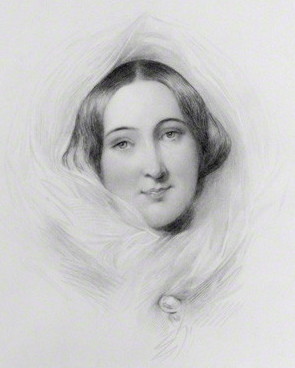
What Edward had missed was one important fact: people liked Rosina. When she was imprisoned, her friends noticed; and they made sure that the public noticed as well. There was an outcry, led by her son Robert (by now a respected diplomat as well as a poet under a pen-name). Within three weeks she had been released. As she later lamented in her autobiography A Blighted Life though, this was not enough to cost Edward the election. In fact, on returning to Parliament he became part of the government and was given the post of “Secretary of State for the Colonies”. In that role his most notable achievement was to preside over the foundation of British Columbia on the western edge of Canada in response to a gold rush there. That wasn’t the most notable incident of his tenure though. That was when he almost became King of Greece in 1862 – or at least, so they say.
A revolution in 1862 had driven the wildly unpopular King Otto from the throne, but the British were worried that a Greek republic might be politically destabilising. So they were offered the British holdings in the Ionian Isles if they set up a constitutional republic with a pro-British king. They held a referendum to decide who should be their new king, and the runaway winner (with 95% of the vote) was Prince Alfred of Edinburgh, Queen Victoria’s second son. However he was the Duke of Saxeburg-Gotha in Germany and didn’t want to give up that holding to become king of Greece. When he refused the throne the “Ionian question” came into sharp focus, but eventually it was decided that a 17-year old Danish prince named William would be the new Greek king. Edward was deeply involved in the discussions around this (as a colony, the Ionian Isles fell under his office); and there’s a persistent rumour that he was offered the crown himself at one point. Of course the crowned heads of Europe would never have accepted his appointment so it cannot have been meant seriously, but it added another layer to the Bulwer-Lytton legend.
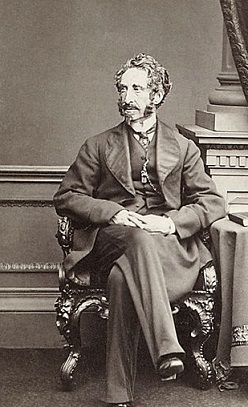
In 1866 Edward was raised to the peerage as Baron Lytton, a title that would certainly have pleased his mother. His brother Henry joined him there five years later as Baron Bulwer. That same year Edward (who continued to be a prolific author) wrote one of his most influential books: Vril, the Power of the Coming Race. Edward had become more and more interested in occult subjects over the years, and the book was based on that. It told the story of a man who discovers an ancient underground city populated by more evolved humans who use psychic powers as well as a mysterious energy source called “vril” to dominate their environment. Despite the fact that Edward published the book anonymously it was still a huge success, enough that “vril” entered the popular vocabulary as a synonym for life energy. (One major lasting legacy of that is the beef drink Bovril – “bovine vril”.) It wasn’t long before people realised that Edward was the author, and that’s where the trouble began.
It’s important to remember that Edward Bulwer-Lytton was a bona-fide celebrity at this time. He was, in his lifetime, a more popular writer than Charles Dickens (who was a friend of his). The chance to associate his name with their schemes was a potential gold-mine for the various occult societies of Britain at the time. Despite mining occult thinking for his novels, Edward was not interested in such things himself. But that didn’t stop them claiming him as a member. A novel he had written in 1842 called Zanoni, which had the framing device of being “an ancient Rosicrucian manuscript”, was now seized on as evidence that Edward was a “Rosicrucian Master”. In fact the Societas Rosicruciana in Anglia declared him their “grand patron”, something which he complained about in letters to his friends. There was nothing he could do about it though. The theosophist Helena Blavatsky also commandeered his writings (if not his name), folding “vril” and the underground civilization that wielded it into her philosophy and writings. (There are even claims that Nazi scientists were trying to find and harness the power of “vril” in the 1930s.)
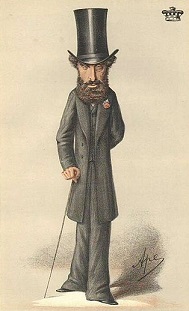
All of this unwanted notoriety would not have been welcome to Edward, who at the time was more concerned with his worsening deafness. Around the same time as publishing “The Coming Race he had been forced to retire to Torquay due to the pain and debilitation caused by a disease of the ear. In 1872 he was operated on to try and cure it, but it gave him an infection that, after several weeks of illness, finally killed him January of 1873. His final book, a history of Athens, was published after his death. He had wanted a quiet burial, but public pressure due to his popularity led to him being buried in Westminster Abbey. In a posthumous piece of snobbery against his populist works though he was not buried in “Poets’ Corner” but rather in St Edmund’s Chapel, a much more out of the way location.
This proved somewhat prophetic as over the following decades Edward Bulwer-Lytton’s work took a nosedive in popularity. His writing had been very “of its time”, and once that time had passed it seemed old-fashioned and far from classic. The fact that Rosina published her autobiography My Blighted Life in 1880 also helped to blacken his reputation. But his influence on the culture of the English-speaking world is undeniable. For example, he coined the phrase “The pen is mightier than the sword”; an almost Shakespearian feat of creating something that simply became part of the language. Nowadays though his memory is almost entirely kept alive by ridicule. In 1982 Professor Scott E. Rice (an American who has made his dislike of Edward’s writing clear) started the Bulwer-Lytton Fiction Contest. Inspired by the use of “It was a dark and stormy night” in the comic strip Peanuts, he offered the prize of “a pittance” to whoever could come up with the worst hypothetical opening sentence to a novel. Twenty-five years later the contest is going strong. It’s an odd legacy for a man who was once the most famous writer in England, and a stark reminder that fame and prestige are fleeting things in the great rush of history.
Images via wikimedia.
[1] Hablot, better known as “Phiz”, was a close friend of Charles Dickens and later became a friend of Edward as well. He even provided illustrations for some editions of Edward’s books, including the frontispiece to Pelham above.

